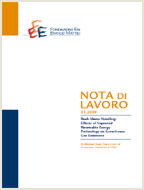The Transmission of Sustainable Harvesting Norms When Agents Are Conditionally Cooperative

13.09.2013
Andries Richter, Johan Grasman
C73, D70, D64, Q20
Common Pool Resource, Conditional Cooperators, Social-Ecological Complexity, Social Capital, Social Norms
Economy and Society
Giuseppe Sammarco
Experimental and observational studies have highlighted the importance of agents being conditionally cooperative when facing a social dilemma. We formalize this mechanism in a theoretical model that portrays a small community having joint access to a common pool resource. The diffusion of norms of cooperation takes place via interpersonal relations, while individual agents face the temptation of higher profits by overexploiting the resource. Agents remain conditionally cooperative, unless other individuals are misbehaving already. We can observe a bubble of conditional cooperators slowly building up followed by a sudden burst, which means that a transition from a cooperative social norm to non-cooperation occurs. Interestingly, in some parameter regions alternative stable states and limit cycles arise. The latter implies that the same community goes through such a transition repeatedly over long time spans – history thus repeats itself in the form of the creation and erosion of social capital.
***
Suggested citation: Richter A., J. Grasman, (2013), ‘The Transmission of Sustainable Harvesting Norms When Agents Are Conditionally Cooperative’, Nota di Lavoro 80.2013, Milan, Italy: Fondazione Eni Enrico Mattei.
